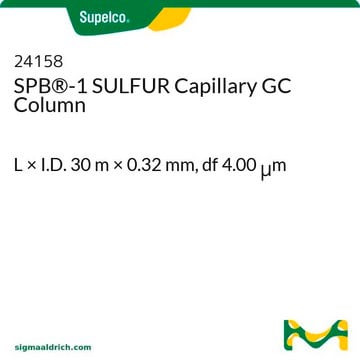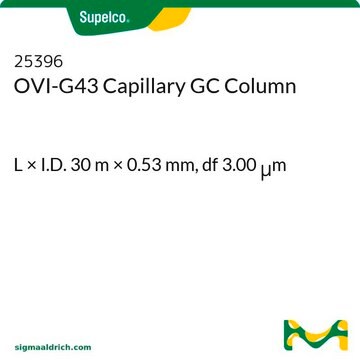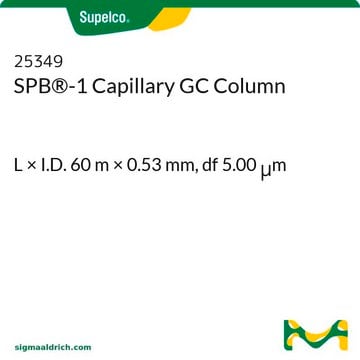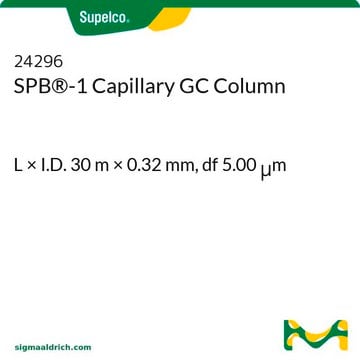24028
SPB®-1 Capillary GC Column
L × I.D. 30 m × 0.25 mm, df 0.25 μm
Faça loginpara ver os preços organizacionais e de contrato
About This Item
Código UNSPSC:
41115710
eCl@ss:
32119290
Produtos recomendados
Materiais
fused silica
Agency
meets requirements for USP G1, G2, and G9
Parâmetros
-60-320 °C temperature (isothermal or programmed)
Valor beta
250
df
0.25 μm
técnica(s)
gas chromatography (GC): suitable
C × D.I.
30 m × 0.25 mm
Grupo ativo da matriz
Bonded; poly(dimethyl siloxane) phase
tipo de coluna
capillary non-polar
Procurando produtos similares? Visita Guia de comparação de produtos
Categorias relacionadas
Descrição geral
Application: This column is often used for traditional general purpose applications, where a non-polar column is required. Analytes will be separated primarily according to boiling point.
USP Code: This column meets USP G1, G2, and G9 requirements.
Phase:
USP Code: This column meets USP G1, G2, and G9 requirements.
Phase:
- Bonded
- Poly(dimethyl siloxane)
- ≤0.32 mm I.D., <2 μm: -60 °C to 320 °C (isothermal or programmed)
- ≤0.32 mm I.D., ≥2 μm: -60 °C to 300 °C (isothermal or programmed)
- ≥0.53 mm I.D., <2 μm: -60 °C to 300 °C (isothermal) or 320 °C (programmed)
- ≥0.53 mm I.D., ≥2 μm: -60 °C to 260 °C (isothermal) or 280 °C (programmed)
Aplicação
SPB®-1 Capillary GC Column was used for speciation of the nitrogen compounds (quantitatively), which are polar and somewhat basic in nature, with chemiluminescence detection.
Outras notas
We offer a variety of chromatography accessories including analytical syringes
Informações legais
SPB is a registered trademark of Merck KGaA, Darmstadt, Germany
Código de classe de armazenamento
10 - Combustible liquids
Classe de risco de água (WGK)
WGK 1
Ponto de fulgor (°F)
214.0 °F - closed cup
Ponto de fulgor (°C)
101.1 °C - closed cup
Choose from one of the most recent versions:
Já possui este produto?
Encontre a documentação dos produtos que você adquiriu recentemente na biblioteca de documentos.
Os clientes também visualizaram
P J Streete et al.
The Analyst, 117(7), 1111-1127 (1992-07-01)
Headspace gas chromatography with split flame-ionization-electron-capture detection is a simple method of screening for a wide range of volatile substances in biological fluids. A 60 m x 0.53 mm i.d. thick-film (5 microns) fused-silica capillary coated with SPB-1 (Supelchem) with
C B'Hymer
Journal of chromatographic science, 45(6), 293-297 (2007-07-14)
An automated static headspace gas chromatographic method for the determination of residual solvents in the bulk drug substance alpha-phenyl-1-(2-phenylethyl)-piperine methanol, a serotonin 5-HT2 receptor antagonist, is evaluated. The method includes the use of 1-propanol as an internal standard. The gas
C B'Hymer
Journal of chromatographic science, 46(5), 369-374 (2008-05-22)
A static headspace gas chromatographic method is developed and evaluated for the quantitation of residual 2-propanol, methanol, and toluene in bulk (2alpha, 6alpha, 8alpha, 9alpha beta)-octahydro-3-oxo-2,6-methanon-2H-quinolizin-8-yl-1H-indole-3-caboxylate methanesufonate hydrate, a serotonin 5-HT3 receptor antagonist drug compound. This method is accurate and
A Paraneeiswaran et al.
Chemosphere, 95, 503-510 (2013-11-05)
In this study, a promising bioremediation approach was developed to remove [Co(III)-EDTA](-) complex that is generated during the waste management process. Though several studies have been reported on bioremediation of cobalt, the removal of [Co(III)-EDTA](-) complex has not been tested.
A M Roccamo et al.
The European journal of neuroscience, 11(5), 1615-1623 (1999-04-24)
The properties of the nicotinic acetylcholine receptor (AChR) are modulated by its lipid microenvironment. Studies of such modulation are hampered by the cell's homeostatic mechanisms that impede sustained modification of membrane lipid composition. We have devised a novel strategy to
Nossa equipe de cientistas tem experiência em todas as áreas de pesquisa, incluindo Life Sciences, ciência de materiais, síntese química, cromatografia, química analítica e muitas outras.
Entre em contato com a assistência técnica






